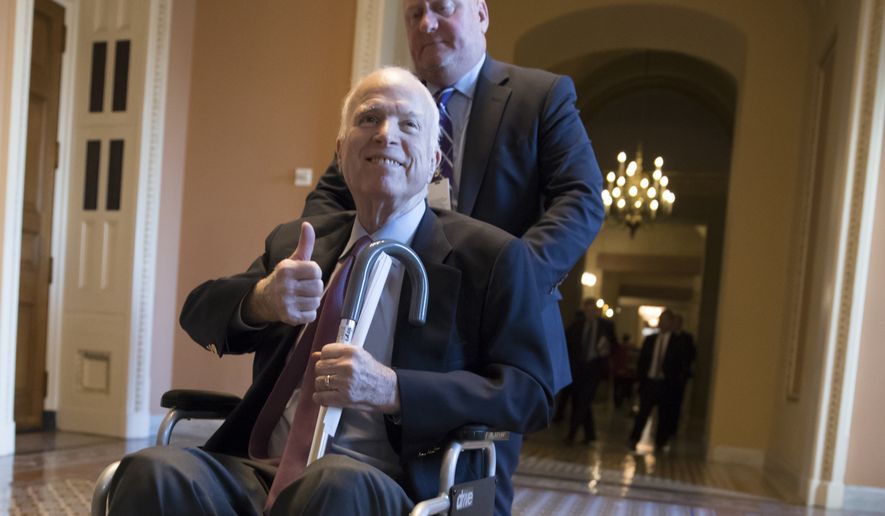Sen. John McCain rejoined the immigration debate Monday with a generous amnesty proposal for potentially 3 million illegal immigrants in exchange for promises of future border security — but the White House quickly rejected the plan, saying it fails President Trump’s test.
With the Senate slated to begin debating immigration by the end of this week, the bill GOP leaders bring to the floor will go a long way toward shaping the debate.
The White House is still pressing for Mr. Trump’s four-point “framework” to be the battlefield, but Senate Majority Leader Mitch McConnell had yet to announce a decision.
“I think there are a lot of competing pressures at this moment,” said Marc Short, the director of legislative affairs at the White House. “We felt the proposal we put forward was a compromise proposal that should be able to earn bipartisan support and we would like to see it as the baseline for immigration.”
Sens. Charles E. Grassley of Iowa and John Cornyn of Texas, two senior Republicans, were trying to adapt a bill to conform to Mr. Trump’s four pillars: citizenship rights for up to 1.8 million illegal immigrant “Dreamers”; a $25 billion trust fund for the border wall along with other changes to speed up deportations for new arrivals; limits to the chain of family migration; and an end to the diversity visa lottery.
But a new counterproposal was unveiled Monday by Mr. McCain and Sen. Chris Coons, Delaware Democrat. The bill tracks with a bipartisan House proposal released last month that would grant a pathway to citizenship to potentially more than 3.2 million illegal immigrants, allowing anyone who came before age 18 and before 2014 to apply for legal status.
“Our legislation, which already has broad support in the House of Representatives, would address the most urgent priorities of protecting Dreamers, strengthening border security, alleviating the backlog in immigration courts, and addressing the root causes of illegal immigration,” Mr. McCain said in a statement.
The bill does nothing to limit the chain of family migration nor does it end the diversity visa lottery, as Mr. Trump has called for.
Instead it would pump money into the struggling countries of Central America, hoping the cash will convince their governments to improve conditions and try to do more to keep their citizens at home.
The bill also adds immigration judges to the system, which could help speed deportation cases.
But the crux of the bill’s border security is a call for a study — the latest in a series of such studies — to determine what’s needed. Homeland Security would then be given until 2021 to follow through.
Mr. Coons, speaking on MSNBC on Monday, said the bill would need border security spending added to it to gain more Republican support.
“It needs more border investment,” he said. “It lays out a plan — a pathway toward securing control of the border by 2020. And I expect that in order for this to be embraced by Republicans … we will need to add some border funding to it.”
The White House doubted the McCain-Coons bill would gain traction, saying as it stands now, it’s worse than the plan Mr. Trump already rejected from Sens. Lindsey Graham, South Carolina Republican, and Richard J. Durbin, Illinois Democrat.
“It takes a special kind of bill to be worse for the American people than Graham-Durbin. But congratulations to Sens. McCain and Coons for developing one that’s worse,” said White House spokesman Hogan Gidley.
He said there have been enough studies of border security and Homeland Security has already said it wants more fencing along the Mexico border.
“Walls work,” Mr. Gidley said. “The president wants to protect the American people with a wall and any bill that doesn’t have the wall component funded is a nonstarter.”
The Senate is slated to begin the debate by early next week, after Congress approved another stopgap spending bill to keep the government open beyond a Thursday deadline.
Mr. McConnell had said if there was no grand bargain on immigration by Feb. 8, he would begin a wide-ranging floor debate complete with an open amendment process.
Given that any bill will require 60 votes to clear the Senate — and then have to survive the House later — it will be difficult to produce a result.
Mr. Cornyn said Mr. Trump’s offer remains the key proposal on the table and said he’s been waiting for Democratic leaders to make a counter. So far, none have come.
“What we need is a good-faith counterproposal to what the president made,” the Texan said.
• Stephen Dinan can be reached at sdinan@washingtontimes.com.
• S.A. Miller can be reached at smiller@washingtontimes.com.




Please read our comment policy before commenting.